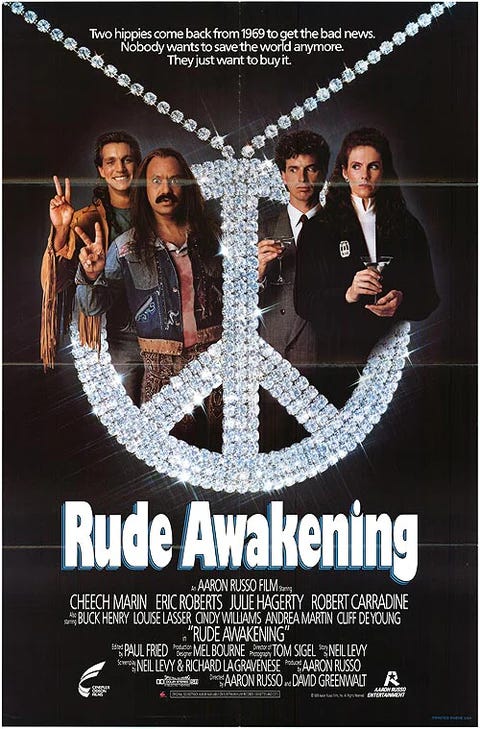Lalaland: A Land Far Away From The Ugly Truth
Think The Internet Is Losing Touch With Reality? Look Where Hollyweird Is
Pretty Corpses Still Rot
There have been a spate of articles, essays, the like, about how out of touch the Internet is with reality.
Reality doesn’t resemble TikTok
The Internet has too many main characters that are nobodies in real life
The Internet is too big for Joe Lunchpail to process
Podcasts aren’t as talked about amongst NYC mainstream journalists people as TV shows are
All of this falls on the right side of accurate. But if the Internet is divorced from reality, then Hollywood is more out of touch than a corpse. All the embalming won’t revive it. This is not only because Hollywood is in the red, though that doesn’t help.
From the indispensable Freddie deBoer:
Stop me if you’ve heard this one before! A piece of pop culture has been announced, one with a diverse cast of characters and themes of female empowerment. Some conservative idiots lose their minds because they’re conservative idiots. Liberals respond by taking to the ramparts to defend the honor of the piece of pop culture against MAGA or whatever. Meanwhile, the actual artistic value of the pop culture in question is completely lost. Aesthetic concerns are buried beneath the demand to be political first. If you aren’t actively singing the praises of worthless shlock that’s vaguely associated with progressive politics, you’re one of them.
There are many reasons why Hollywood is lost in the clouds. The most obvious one is that it is inflating its contribution to the culture war as more people see through the corporate optics maneuver it clearly is. As of this past month, even center-left media institutions saw past Billy Eichner’s gay-card play and admitted that Bros was giving “homework” vibes.
Here are some other barriers between Hollywood and reality:
At a time of economic decline, nepo babies are not particularly inspiring
Hollywood would rather clone proven stars than build new ones
Not since the late ‘60s has Hollywood been this out of step with the cultural climate.
That last one wasn’t a clickable link, but it is true. What Hollywood does not understand about the Culture War is it isn’t a war between two countries. It is a world war, with many entities that have their own interests. But in any and every show and movie from a major studio, the script is the same one as the ‘70s. Bigots are dumb. Center-left liberals are quippy and cute. Minority culture is distilled into a form that flatters and coddles bourgeois white liberal egos. But the left itself is divided as is the right. Where is the show for the dirtbag-left? The major Hollywood comedy for the post-left? The SNL sketch that speaks to the mecha-tankies?
from the book Rock Me on the Water:
Very few would have predicted this outcome just a few years earlier. Even into the late 1960s, none of the entertainment industries reflected the social changes coursing around them. Hollywood, at a low ebb financially and artistically, was dominated by bloated historical epics and musicals; television, operating under the theory of what one top executive labeled the “least objectionable program,” narcotized American households with a deadening array of rural comedies; and while rock music ruled the AM airwaves, the record labels had not yet accepted the idea of the album as a coherent artistic and social statement.
If the Internet is divorced from reality, then Hollywood is more out of touch than a corpse. All the embalming won’t revive it.
The cause of this blindness this time around though is different and paradoxical. In the '60s, Hollywood was clinging to the High Imperial Aesthetic of historical epics and musicals. This time the focus is on appeasing tweetniks on Twitter. After all, this is all a response not only to #blacklivesmatter and #metoo but to #oscarssowhite and other hashtag hippie campaigns.
Hashtags and Flashbacks
And now we have arrived at the crux of our narrative. The heroes of New Hollywood became the octogenarian suits of today. All the money and sex in the universe will not buy back their idealism, vigor and fire from their younger hippie days. But oh how godlike and omnipotent it must make them feel to tickle the fancy of the young nubile hasthag hippies asking for change. #oscarssowhite reminds them of the march on Washington. Of course they will heed the call.
But here is the rub: the reason New Hollywood succeeded and Brand New Hollywood is sinking is because New Hollywood told the audience what it liked. How many hippies were mad that M*A*S*H* was about the Korean War, not Vietnam? How many civil rights activist were furious when Archie Bunker said ethnic slurs? But there were no hashtag hippies then, just hippies. No matter how much acid was in the punch bowl, no hippie was crazy enough to picket shows and movies. That was a game for churchgoers and holy rollers. Now that it is so easy to share resentments over every single mistake Hollywood makes, no complaint is too minor for the people-pleasing police. Needless to say, the more catered to any person or group is, the more likely they are to complain and never be satisfied.
Hollywood does have another master though: money. And in the ‘00s, before the hashtag hippies became a force, it was the nerds that called the shots. Daredevil was a terrible film. Iron Man was GOAT. Before there was corporate wokeness in Hollywood, there was fan service.
I am saying nothing new by pointing out that the comic book nerd camp and the Tumblr liberal crowd are butting heads. But Hollywood worships money. Why stop making Marvel movies and focus on smaller, intimate idpol stories when it can reboot major superheroes and IP with blacks, women, Arab dwarves?
Now that it is so easy to share resentments over every single mistake Hollywood makes, no complaint is too minor for the people-pleasing police.
I honestly don’t remember where I read this, but I feel its common knowledge that video represents the present and film represents the past. That is unquestionably true about Hollywood. The Internet is out of touch with reality. But in a different way. The Internet is a reservoir of images, ideologies, even actions that most people understand have no place in IRL polite society. Hollywood is a theater of ghosts. Heroes from the past, stars from the past, all digitally embalmed for comfortable viewing.
It’s funny that Hollywood is considered a major component of legacy media. It might end up having the worst legacy of all. No matter how many classic stars and stories Hollywood tells, these films will have no place in the canon of the future. Erik Hoel delved into how to make art that lasts for centuries. One barrier is “incommensurability.”
Thomas Kuhn, who argued that science progressed in paradigm shifts, introduced a notion called “incommensurability” in his book The Structure of Scientific Revolutions. When a new scientific paradigm gets introduced, it’s not that old theories and empirical data are all falsified, but rather that previous research becomes incommensurate with the new paradigm….
Stories, art, essays, fictions—they have their own form of incommensurability as well. This often follows an artistic paradigm shift, like from modernism to postmodernism. But it also can occur via slow drift as the links of meaning are broken by too much change in society’s semantic web.
This artistic incommensurability explains why what for Melville was so explicitly not the Frivolous Now, over the long march of history, became precisely that. Back when Moby-Dick was published there was no theory of evolution by natural selection. Only eight years later would On the Origin of Species appear. How might Moby-Dick have changed, had the order been reversed…
For what in Moby-Dick across clearly after almost two centuries is Melville’s naturalist eye—not his religious one. This is because science has replaced religion as the most universal set of references.
I am not the first to point out that wokeness is like a religion, especially on Twitter. I am also well-aware that New Hollywood had its fair share of woke programming. But these have been eroded by mighty waves of time. History is a tale of conflicts. All in the Family was controversial. Diff’rent Strokes wasn’t. I don’t need to tell you which one survived intact.
How ironic that Marvel is being used as a battering ram for anodyne mediocrity. The reason why Marvel comics became more popular in the first place was because of conflict. The Fantastic Four argued with each other. Peter Parker had difficulty paying rent. Meanwhile it was the DC heroes that were blank avatars for the dominant ideology of the day. That is why even now, DC fans have the lonelier table at the geek cafeteria. Although Marvel is losing its cool kids to Image and Icon comics. A fact that Netflix is well aware of.
Returning to Reality
(Caveh Zahedi, right, in Waking Life)
Netflix does not have the Daredevil show anymore. But it has The Umbrella Academy, which is an absolute hit. So far its the only comic book show that is not a Marvel or DC property to bring in major revenue for Netflix. But I would expect more, not less.
Netflix may not be the huge money maker it once was, but, like Twitter, it is still central to the conversation in a way even Disney Plus is having difficulty doing. One reason: an old-fashioned something for everyone philosophy. Netflix stood by Dave Chappelle when Twitter called for his head on a spike. When they didn’t budge, Netflix employees protested. Even Netflix “stars” like Hannah Gadsby threatened to leave. And yet, she is releasing a new special on Netflix.
Dahmer is an enormous hit on Netflix now. This despite a campaign against it for several reasons. One of them: to get the LGBTQ tag removed. Even though Dahmer and his victims were gay. The logic: because it is next to heartwarming, sexy fun shows like Heartstopper, this is, like, giving major cringe. As it should. The LGBTQ reality is not all musicals and shopping. It is violence, bloodshed, tears. To paraphrase the otherwise repugnant Ben Shapiro, reality doesn’t care about your rom-com queue.
Blonde has received an even bigger backlash. There is a scene in which Marilyn Monroe is forced to have an abortion and the fetus asks her, “You won’t hurt me this time, will you?” From a paint-by-numbers culture war perspective, this could not have come at a worse time. Pro-lifers have taken the ball and run with it while Planned Parenthood is sputtering mad. Consider the following: a) Marilyn in this context was forced to have an abortion. It was not her choice. This actually is a pro-choice narrative, but in a more complicated, troubling way. b) This is not a biopic. It is based on a book by Joyce Carol Oates. So it is not about Marilyn’s life. It is about her retelling of Marilyn.
Controversial though these works are, no one can stop talking about them. Or Midnight Club. One could almost say that, with Game of Thrones out of the way, Netflix has become the lightning rod for the monoculture, which would be a victory for Hollywood if Netflix didn’t hate Hollywood so damn much.
Disney took Daredevil away and made him She-Hulk’s teddy bear. NBC took The Office away. Too bad Peacock can’t fly. But the biggest FU to Netflix from Hollywood was the petty Oscar tug-of-war. Roma lost. Marriage Story. The Power of the Dog lost. Yet Apple TV took home the first Best Picture win for a streamer for the cutesy, heartwarming, critically tolerated CODA. Blonde. then, stands before us not as an Oscar hopeful, but as a film free from the stifling gaze of the Academy. And unlike the other Oscar hopefuls, everyone is talking about it.
But the most promising routes to reality have been NYC indie films (which I have mentioned not once but twice before) and what I call “reality exploration TV.” While I would say that Peak TV is on a downward slope, two shows (The Rehearsal on HBO Max and The Show about the Show on Bric TV and YouTube) have stayed in touch with reality not by presenting it straightforward but fake (RHONY) but by being straightforward about their fakeness. The Rehearsal has grabbed the conversation with its absurd, Borgesian twists of reality. A replica of The Alligator Lounge in Williamsburg sits in a warehouse where creator/star Nathan Fielder drinks alone. Nathan makes an acting class to teach his actors to effectively portray his subjects. When one of them misses the mark, Nathan makes a replica of the class and pretends to be the struggling student, replicating his home and home life to see the issue. Caveh Zahedi looks at reality from a less byzantine, but no less maddening perspective. His show is about the making of the show. Each episode is about the making of the previous episode. When he is lucky enough, he captures reality as it happens. But more often than not, everything is reenacted with actors.
These point the way forward for Hollywood. Instead of pretending to represent reality for it audience (or as its audience supposedly sees it) they take the more courageous approach of acknowledging that they don’t know what reality is. Which is admirable and also an accurate reflection of everyone’s current reality.







